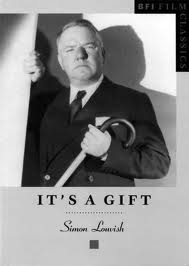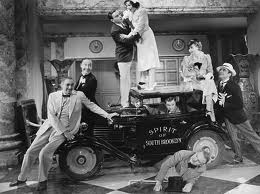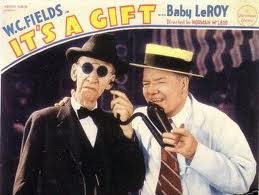 If you follow Simon
Louvish's essay carefully, you can see that It's A Gift is an important film
for W.C. Fields, marking in a sense the end of his reliance on
patching together vaudeville sketches. His later films would be more
complete, if no more coherent, screen stories, in which he did the
lion's share of the screenwriting himself. But as Louvish makes
plain, the essence of Fields' films was Fields himself, and to some
extent the character we associate with him was as much a product of
vaudeville as the routines he left us on film.
If you follow Simon
Louvish's essay carefully, you can see that It's A Gift is an important film
for W.C. Fields, marking in a sense the end of his reliance on
patching together vaudeville sketches. His later films would be more
complete, if no more coherent, screen stories, in which he did the
lion's share of the screenwriting himself. But as Louvish makes
plain, the essence of Fields' films was Fields himself, and to some
extent the character we associate with him was as much a product of
vaudeville as the routines he left us on film.
This was one of the
early entries in the excellent BFI Film Classics series, when it was
at its best edited by Edward Buscombe. Louvish's massive and detailed
biography of Fields, Man On The Flying Trapeze, would be published
three years later, but this slim volume provides just enough
information about the man to leave the decision whether to pursue his
inner genius and inner demons further to you. Here, Louvish takes
apart It's A Gift, analysing the set-pieces in terms of Field's stage
acts, ending with the apotheosis, the back porch scene, which
culminates in the brilliant exchanges with T. Roy Barnes' insurance
salesman. This is Fields at his best, and Louvish not only draws out
the background, but also allows the scene to play.
Dealing with the period
leading up to It's A Gift, Louvish notes Fields' short, The Fatal
Glass Of Beer, was his only box-office failure in the early 30s,
calling it 'the most surreal movie ever made by a major studio'. But
he's also just mentioned, in passing, International House, a surreal
variety film in which Fields' presence alongside Bela Lugosi and
Peggy Hopkins Joyce is almost literally surreal, but also in which he
gets virtually all the good lines (apart from those reserved for
George Burns & Gracie Allen, which come out of their routines).
There are also very loaded double-entendres, usually at the expense
of Joyce, who started in vaudeville too before moving on to a career
as an international playgirl. I love International House, and Louvish
makes the point that Fields didn't go off into 'never-never land'
again until Never Give A Sucker An Even Break.But for me it also
reinforces the most telling bit of Louvish's essay, in which he
compares Fields to Samuel Beckett and Harold Pinter.
International House, a surreal
variety film in which Fields' presence alongside Bela Lugosi and
Peggy Hopkins Joyce is almost literally surreal, but also in which he
gets virtually all the good lines (apart from those reserved for
George Burns & Gracie Allen, which come out of their routines).
There are also very loaded double-entendres, usually at the expense
of Joyce, who started in vaudeville too before moving on to a career
as an international playgirl. I love International House, and Louvish
makes the point that Fields didn't go off into 'never-never land'
again until Never Give A Sucker An Even Break.But for me it also
reinforces the most telling bit of Louvish's essay, in which he
compares Fields to Samuel Beckett and Harold Pinter.
 International House, a surreal
variety film in which Fields' presence alongside Bela Lugosi and
Peggy Hopkins Joyce is almost literally surreal, but also in which he
gets virtually all the good lines (apart from those reserved for
George Burns & Gracie Allen, which come out of their routines).
There are also very loaded double-entendres, usually at the expense
of Joyce, who started in vaudeville too before moving on to a career
as an international playgirl. I love International House, and Louvish
makes the point that Fields didn't go off into 'never-never land'
again until Never Give A Sucker An Even Break.But for me it also
reinforces the most telling bit of Louvish's essay, in which he
compares Fields to Samuel Beckett and Harold Pinter.
International House, a surreal
variety film in which Fields' presence alongside Bela Lugosi and
Peggy Hopkins Joyce is almost literally surreal, but also in which he
gets virtually all the good lines (apart from those reserved for
George Burns & Gracie Allen, which come out of their routines).
There are also very loaded double-entendres, usually at the expense
of Joyce, who started in vaudeville too before moving on to a career
as an international playgirl. I love International House, and Louvish
makes the point that Fields didn't go off into 'never-never land'
again until Never Give A Sucker An Even Break.But for me it also
reinforces the most telling bit of Louvish's essay, in which he
compares Fields to Samuel Beckett and Harold Pinter.
Louvish mentions
Beckett's self-acknowledged debt to vaudeville, but what is worth
noting is both the quality of the delivery—compare Bert Lahr in
Waiting For Godot to Fields, the forced nature of even the most
off-hand comment, the timid drifting off of sharp irony, and you'll
see how true that is. No Theatre Of The Absurd without Fields is an
exaggeration, but it does lead one to consider the basic
psychological malfunction which Fields' characters find, primarily
when faced with 'modern' American life.
Which was true of
Fields himself.  His companion of many years Carlotta Monti, once
claimed Fields relative lack of stardom was down to, as director
Eddie Sutherland told her, his not being liked by women. There is a
misogyny to his character which influenced American sitcoms starting
with Life Of Riley and The Honeymooners. Yet he was a brilliant Mr.
Micawber, a role Dickens might have created for him.
His companion of many years Carlotta Monti, once
claimed Fields relative lack of stardom was down to, as director
Eddie Sutherland told her, his not being liked by women. There is a
misogyny to his character which influenced American sitcoms starting
with Life Of Riley and The Honeymooners. Yet he was a brilliant Mr.
Micawber, a role Dickens might have created for him.
 His companion of many years Carlotta Monti, once
claimed Fields relative lack of stardom was down to, as director
Eddie Sutherland told her, his not being liked by women. There is a
misogyny to his character which influenced American sitcoms starting
with Life Of Riley and The Honeymooners. Yet he was a brilliant Mr.
Micawber, a role Dickens might have created for him.
His companion of many years Carlotta Monti, once
claimed Fields relative lack of stardom was down to, as director
Eddie Sutherland told her, his not being liked by women. There is a
misogyny to his character which influenced American sitcoms starting
with Life Of Riley and The Honeymooners. Yet he was a brilliant Mr.
Micawber, a role Dickens might have created for him.
He was an alcoholic,
and Louvish's brief account of his facing the DTs in the period just
after It's A Gift was made is particularly touching. His grandson
Ronald produced a warts-and-all biography which made much of Fields'
worries, about his eczema, his unattractiveness to women, and he may
have had a huge fear of VD, which may have originated in his seeing a
presentation about the dangers of promiscuity in the 1920s. At any
rate, when asked by an interviewer if he'd ever been put at great
risk he did answer, 'Yes, sitting on a toilet seat after Greg LaCava
just got off.' Fields' was estranged from his wife and son, and had
probably suffered a rough upbringing from his own father. In such
things often lie the roots of humour, and of the neuroses which power
the Theatre of the Absurd. And they certainly powered Bill Fields.
It's A Gift by Simon Louvish
BFI Film Classics (1994), no price listed, ISBN 0851704727

No comments :
Post a Comment